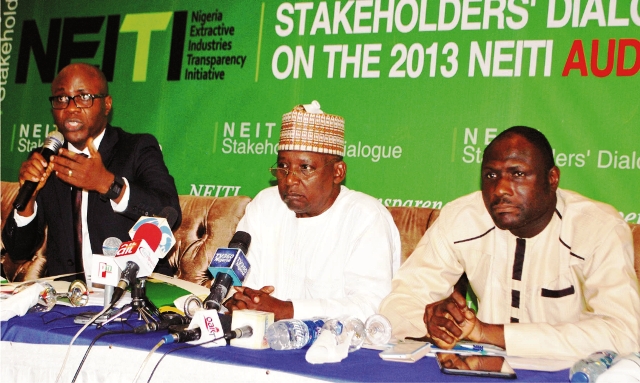Oil & Energy
FG Develops 3-Phased Road Map For Improved Power

The Federal Government
says it has developed a three-phased roadmap aimed at ensuring improved electricity generation, transmission, and distribution in the country.
The Minster of Power, Works and Housing, Mr Babatunde Fashola, stated this in Abuja lastThursday when he featured at the inaugural edition of the ‘Podium‘, a forum with the theme: “Fixing Nigeria’’.
The forum was organised by the Kuka Centre, a Nigeria-based policy research institute with the objective of ensuring that political leadership is a collaborative exercise requiring multiple governance structures at various levels
“For power, the plan is a road map of three phases, the first phase is incremental power, the second phase is steady power and the third phase is uninterrupted power.“
He said the optimum capacity of power that Nigeria had produced in its 66 years of existence was 5,074 megawatts of power
He said it was that reason government decided to design a road map for improved power supply.
According to him, the 5,074 megawatts was not enough to service the energy needs of the growing population, hence the need to get more power through incremental process.
He said the incremental process would entail the deployment of rural electrification implementation plan, adding that strategies had been drawn to ensure full implementation of the plan.
He also said the incremental process would consist of the use of other energy sources to increase power production in the country.
Fashola said the completion of some abandoned transmission projects as well as the completion of the National Integration Power Project (NIPP) were a process within the incremental phase.
According to the minister, the second phase is aimed at ensuring that every Nigerian gets adequate power.
He said that could be achieved through the use of accurate data of electricity consumers in the country.
He stated that it is important to know the number of electricity consumers in the country.
Fashola said a reliable data gathering format was required to know the energy needs of each household.
He added that part of the plan was to ensure regular maintenance and replacement of equipment used in the power value chain.
On the uninterrupted energy phase, he said the responsibility rested on consumers of electricity.
According to him, this is based on how conscious and conservative Nigerians are in the use electricity.
He said the phase would entail the adoption of an energy-saving culture by Nigerians.
“The uninterrupted energy phase, which is the third phase, is really more in our hands than in the hands of government.
“How much we now use energy, how conservative we are, how energy-conscious we are and how much we save as a matter of culture.
“It is mainly about conservation; about lifestyle choices; about the way we use energy and about the way we conserve energy.“
Oil & Energy
FG Explains Sulphur Content Review In Diesel Production
The Federal Government has offered explanation with regard to recent changes to fuel sulphur content standards for diesel.
The Government said the change was part of a regional harmonisation effort, not a relaxation of regulations for local refineries.
The Chief Executive, Nigerian Midstream and Downstream Petroleum Regulatory Authority (NMDPRA), Farouk Ahmed, told newsmen that the move was only adhering to a 2020 decision by the Economic Community of West African States (ECOWAS) which mandated a gradual shift to cleaner fuels across the region.
Ahmed said the new limits comply with the decision by ECOWAS that mandated stricter fuel specifications, with enforcement starting in January 2021 for non-ECOWAS imports and January 2025 for ECOWAS refineries.
“We are merely implementing the ECOWAS decision adopted in 2020. So, a local refinery with a 650 ppm sulphur in its product is permissible and safe under the ECOWAS rule until January next year where a uniform standard would apply to both the locally refined and imported products outside West Africa”, Ahmed said.
He said importers were notified of the progressive reduction in allowable sulphur content, reaching 200 ppm this month from 300 ppm in February, well before the giant Dangote refinery began supplying diesel.
Recall that an S&P Global report, last week, noted a significant shift in the West African fuel market after Nigeria altered its maximum diesel sulphur content from 200 parts per million (ppm) to around 650 ppm, sparking concerns it might be lowering its standards to accommodate domestically produced diesel which exceeds the 200 ppm cap.
High sulphur content in fuels can damage engines and contribute to air pollution. Nevertheless, the ECOWAS rule currently allows locally produced fuel to have a higher sulphur content until January 2025.
At that point, a uniform standard of below 5 ppm will apply to both domestic refining and imports from outside West Africa.
Importers were previously permitted to bring in diesel with a sulphur content between 1,500 ppm and 3,000 ppm.
It would be noted that the shift to cleaner fuels aligns with global environmental efforts and ensures a level playing field for regional refiners.
Oil & Energy
PHED Implements April 2024 Supplementary Order To MYTO
The Port Harcourt Electricity Distribution (PHED) plc says it has commenced implementation of the April 2024 Supplementary Order to the MYTO in its franchise area while assuring customers of improved service delivery.
The Supplementary order, which took effect on April 3, 2024, emphasizes provisions of the MYTO applicable to customers on the Band A segment taking into consideration other favorable obligations by the service provider to Band A customers.
The Head, Corporate Communications of the company, Olubukola Ilvebare, revealed that under the new tariff regime, customers on Band A Feeders who typically receive a minimum supply of power for 20hours per day, would now be obliged to pay N225/kwh.
“According to the Order, this new tariff is modeled to cushion the effects of recent shifts in key economic indices such as inflation rates, foreign exchange rates, gas prices, as well as enable improved delivery of other responsibilities across the value chain which impact operational efficiencies and ability to reliably supply power to esteemed customers.
“PHED assures Band A customers of full compliance with the objectives of the new tariff order”, he stated.
Ilvebare also said the management team was committed to delivering of optimal and quality services in this cost reflective dispensation.
The PHED further informed its esteemed customers on the other service Bands of B, C D & E, that their tariff remains unchanged, adding that the recently implemented supplementary order was only APPLICABLE to customers on Band A Feeders.
Oil & Energy
PH Refinery: NNPCL Signs Agreement For 100,000bpd-Capacity Facility Construction

The Nigerian National Petroleum Company Ltd (NNPCL) has announced the signing of an agreement with African Refinery for a share subscription agreement with Port-Harcourt Refinery.
The agreement would see the co-location of a 100,000bpd refinery within the Port-Harcourt Refinery complex.
This was disclosed in a press statement on the company’s official X handle detailing the nitty-gritty of the deal.
According to the NNPCL, the new refinery, when operational, would produce PMS, AGO, ATK, LPG for both the local and international markets.
It stated, “NNPC Limited’s moves to boost local refining capacity witnessed a boost today with the signing of share subscription agreement between NNPC Limited and African Refinery Port Harcourt Limited for the co-location of a 100,000bpd capacity refinery within the PHRC complex.
“The signing of the agreement is a significant step towards setting in motion the process of building a new refinery which, when fully operational, will supply PMS, AGO, ATK, LPG, and other petroleum products to the local and international markets and provide employment opportunities for Nigerians.
By: Lady Godknows Ogbulu
-

 News3 days ago
News3 days agoBonny-Bodo Road: FG Offers Additional N20bn, Targets December Deadline
-
Business3 days ago
Nigeria Set To Get $2.25bn World Bank Loan … Plans Diaspora Bond
-

 Rivers13 hours ago
Rivers13 hours agoCleric Attributes Nigeria’s Unity To God’s Grace
-

 Oil & Energy9 hours ago
Oil & Energy9 hours agoReps Committee Summons Kyari, Others Over Environmental Degradation
-

 Niger Delta3 days ago
Niger Delta3 days agoMile One Market: Committee Commences Verification Exercise …Denies Allocations Of Shops
-
Sports3 days ago
Chairman Lauds NPFL Referees Improvement
-

 News10 hours ago
News10 hours agoNDLEA Intercepts Cakes Laced With Drugs
-

 Environment9 hours ago
Environment9 hours agoFG Unveils Framework For Washcom Formation, Management

